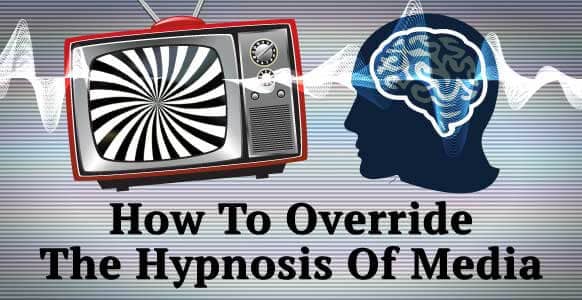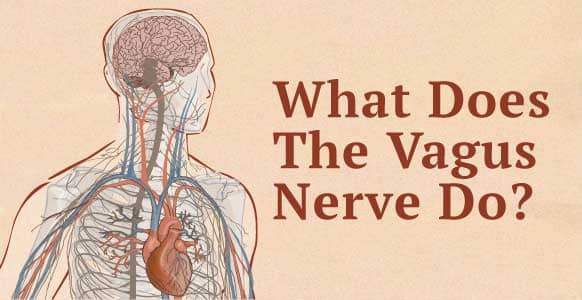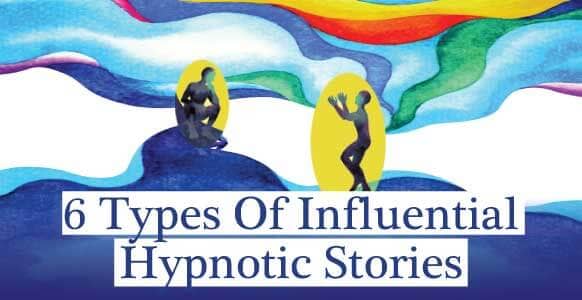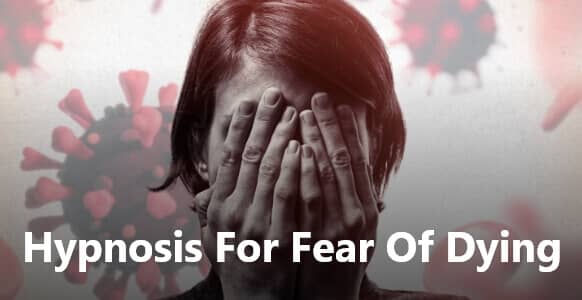
Until recently, fear of dying was probably the last thing on your mind.
You concerned yourself with living and avoided unhealthy morbid thoughts.
But that all changed when the pandemic came along.
Now the fear of dying is in the minds of millions of people worldwide.
That goes for anyone worried about catching the virus, or anyone who has to undergo a medical procedure such as surgery.
Just going to the hospital can potentially put you at risk of exposure, with so many COVID-19 sufferers needing treatment.
Fortunately, however, hypnosis for fear of dying can put those fears at ease.
Why? Because hypnosis is an incredibly powerful way to deal with anxiety, stress and fear.
Reducing anxiety helps your clients get into a more positive mental state so they can deal with things more constructively.
Hypnosis can also be used to rally the body’s natural healing response, helping clients recover from sickness or surgery more quickly.
And the expectation of quicker recovery times helps to alleviate the anxiety and fear.
But what is the fear of dying, and how does it affect you?
The COVID-19 Terror & The Fear Of Dying

An article by the Anxiety & Depression Association of America (ADAA) describes fear as being “like toothpaste you can’t put back in the tube.”
What they mean is that fear is difficult to dial down without help. That’s because the more you focus on a problem, the more anxious you become.
To put it in hypnosis terms, where attention goes, energy flows.
Other research has found that the pandemic has not only increased people’s fear of death in general but has also been the cause of numerous mental health conditions.
There’s a medical term for the fear of dying too. It’s called thanatophobia, from the Greek words thanatos (death) and phobos (fear).
But is there really so much fear flying around? Apparently so.
According to statistics released by the ADAA, Americans believe that 30% of total COVID-19 deaths occur in people aged 44 and younger, while the actual figure is less than 3%.
The truth is that most COVID-19 deaths happen to people over 55 (more than 90%), so the risk of death from the virus is being overestimated enormously.
And here’s another fact that should help to put your mind at ease.
It’s estimated that between 20 and 35% of people who get COVID-19 don’t have any symptoms at all.
While that’s reassuring, it’s not necessarily enough to stop you from worrying about it completely.
So, on the off chance you do experience any symptoms, what might you expect them to be?
Possible Symptoms Of The Coronavirus
Like any illness, not everyone will get all of the symptoms. Here are the main ones to watch out for according to the Mayo clinic.
- A fever
- A continuous cough
- Fatigue
- A loss of the sense of taste or smell
Less common symptoms include:
- Shortness of breath
- Aching muscles
- Headache
- Chest pains
- Nausea
- Vomiting
- Diarrhea
- Rash
As you can see, many of these symptoms are similar to what you might experience with a bad cold or the flu. If you have symptoms that you think might be related to the virus, take a test just to be certain.
Meanwhile, you can reduce your fear and anxiety levels in the short term by choosing not to focus on the worst-case scenario.
Of course, fear of dying affects people in other ways beyond the pandemic, particularly those awaiting a serious operation or recovering from one.
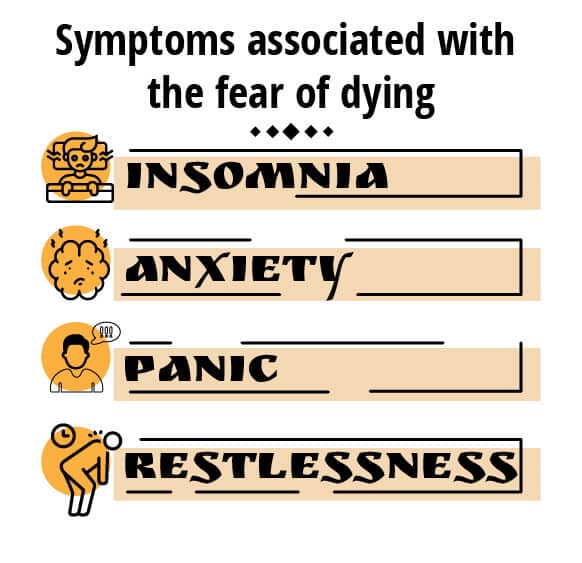
If you need help doing that, you won’t find a better tool than hypnosis.
Hypnosis For Fear Of Dying
You probably already know that hypnosis has a proven track record for dealing with phobias of any kind. Part of the reason why hypnosis is so effective is because of the way it works.
Unlike most other treatments or therapies, hypnosis enables you to relax, to shut out the everyday outside world, and to focus your thoughts and feelings inside.
It helps people turn their attention away from their problems so they can concentrate on the solutions instead.
Once your conscious critical mind switches off, your unconscious mind takes over.
It’s the place where thoughts, emotions, memories, and creativity are stored. And that means it’s possible to access your own inner resources and use those resources to change your thinking and your behavior.
But how does hypnosis for fear of dying work in practice?
It can help people deal with the terror and anxiety brought on by the pandemic. You can’t be anxious when you’re relaxed, and a hypnotic blitz around relaxation is an ideal way to get the ball rolling.
Where phobias are concerned, there are lots of tools available, including the blitz, regression and revivification to access resources from the subject’s past.
For anyone worried about the future, there’s the Non-Awareness Set and Mind-Bending Language, two techniques that will help take attention away from the problem and focus it on finding solutions.
Fear of dying is not a medical issue, so no referral is needed. In any case, someone facing major surgery might not have time to get a referral as their operation could be imminent.
It’s also important to note that in the modern age people have forgotten how to deal with death. That’s because they’re healthier, they live longer and they don’t have to face death as often as in the past.
How Fear Of Dying Affects The Brain
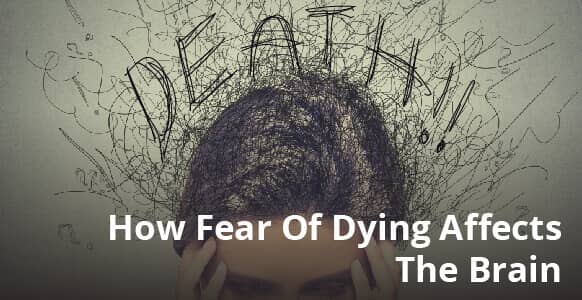
What’s going on in someone’s head when they experience this kind of fear? How are they processing all of these different emotions?
In order to help them fight their fear using hypnosis, it’s important to know what’s happening neurologically.
When someone tries to suppress an emotion, the limbic system becomes more active, increasing the intensity of the emotion.
But when they verbally describe that emotion, the limbic system calms down again.
That’s crucial, because they won’t be able to start looking forward to the future as long as their limbic system is in overdrive. So it’s vital that you allow them to vent.
This emotional release is a major factor in dealing with the fear of death and the terror that surrounds it. The distress your subject feels can only be decreased when they’re able to release those emotions by describing them out loud.
Using Ericksonian Hypnosis For Fear Of Dying
Ericksonian hypnosis refers to Milton Erickson, an American psychiatrist who co-founded the American Society of Clinical Hypnosis in 1957 and whose work with conversational hypnosis has become part of mainstream practice.
At its heart, his style of hypnosis is fundamentally symbolic. Everything symbolizes everything else. Erickson used symbols to transfer meanings from one place to another because symbols are the most efficient way of doing that.
Erickson was a great believer in the power of the metaphor. That’s because metaphor literally means “to carry across” (from the Latin word metaphora). So a metaphor carries meaning across, i.e. from one thing or place to another.
The other reason for using symbols is because the unconscious mind relates to symbols. It also relates to metaphors and stories because these are all processes that stimulate the imagination. And the imagination resides within the unconscious.
One of his many techniques involved planting seeds or priming the subject with ideas throughout the session. An example might be planting the idea of change, so that things will get better in the future, giving the subject hope.
These “seeds” are created using language patterns, trance training skills, memory tools and other hypnotic experiences. For example, you can symbolically link the idea of comfort to the concept of appreciation using this type of language:
“Isn’t it nice that your arm can feel comfortable like that, and even though your body is on the edge of terror, your arm can be free and comfortable. And it’s such a small experience.”
Stories, anecdotes and humor can also be used to stimulate transformation at the unconscious level, as long as you’ve planted the seeds of what you want to do beforehand. Remember also that you can start planting these seeds right away in your pre-talk.
Another useful tool for dealing with the fear of death or dying involves the use of conscious/unconscious disassociation. How might you apply that technique when working with a client?
Chances are that they drive a car. It’s entirely possible that driving a car could result in a horrific life-threatening accident. But they still get in the car and drive, knowing the risks.
Their conscious mind is fully aware of the danger, but it can forget it while they are driving. Meanwhile their unconscious mind has faith and hope in the fact that they’ll reach their destination safely.
So instead of investing their energy in the fear or terror, they’re investing it in living.
That’s the kind of powerful impact you can expect from hypnosis for fear of dying.
Conclusion & Takeaways
Feeling some anxiety about death is completely normal. After all, no one wants to die, do they?
But when the anxiety and fear escalates and starts to interfere with a person’s daily life, that’s when it becomes a phobia. In many cases it can lead to avoiding other people, isolation and even depression.
The fear of dying is also known as thanatophobia. It has become a major issue worldwide since the outbreak and ongoing threat from COVID-19.
Fortunately, hypnosis is one of the most effective methods for dealing with terror and the fear of dying.
It’s been shown that Americans tend to overestimate the risks associated with coronavirus. Even so, if you develop any of the following symptoms, you should try to get a test as quickly as possible:
- A fever
- A continuous cough
- Fatigue
- A loss of the sense of taste or smell
Fear of dying also affects people in other ways, such as those awaiting an operation or recovering from one. Some of the non-COVID symptoms include:
- Insomnia
- Anxiety
- Panic
- Restlessness
Hypnosis for fear of dying shifts attention away from problems and towards solutions. By tapping into the unconscious mind it allows you to access resources you can use to change your thinking and your behavior.
Hypnosis techniques can help clients deal with the terror and anxiety they’re experiencing. The hypnotic blitz can promote relaxation, while regression and revivification are useful for accessing resources from the client’s past that they can bring forward into the present and future.
And for moving attention away from negative problems and towards positive solutions, there are no better tools than the Non-Awareness Set and Mind-Bending Language.
Another approach involves Ericksonian hypnosis, based on using symbols to transfer meanings from one place to another. The unconscious mind relates really well to symbols, metaphors and stories that all serve to stimulate the imagination.
The other reason for using symbols is because the unconscious mind relates to symbols. It also relates to metaphors and stories because these are all processes that stimulate the imagination. And the imagination resides within the unconscious.
One of Erickson’s many techniques involved planting seeds or priming the subject with ideas throughout the session. An example might be planting the idea of change, so that things will get better in the future, giving the subject hope.
All of these techniques are designed so that instead of clients investing their energy in the fear or terror, they’re investing it in living and getting on with their life.










![Yogic Breathing For Hypnosis: 3 Easy Techniques To Ground & Relax Your Clients Before Inducing A Hypnotic Trance [Includes Infographic] Yogic Breathing For Hypnosis: 3 Easy Techniques To Ground & Relax Your Clients Before Inducing A Hypnotic Trance [Includes Infographic]](https://hypnosistrainingacademy.com/wp-content/uploads/2019/05/yogic-breathing-for-hypnosis.jpg)

